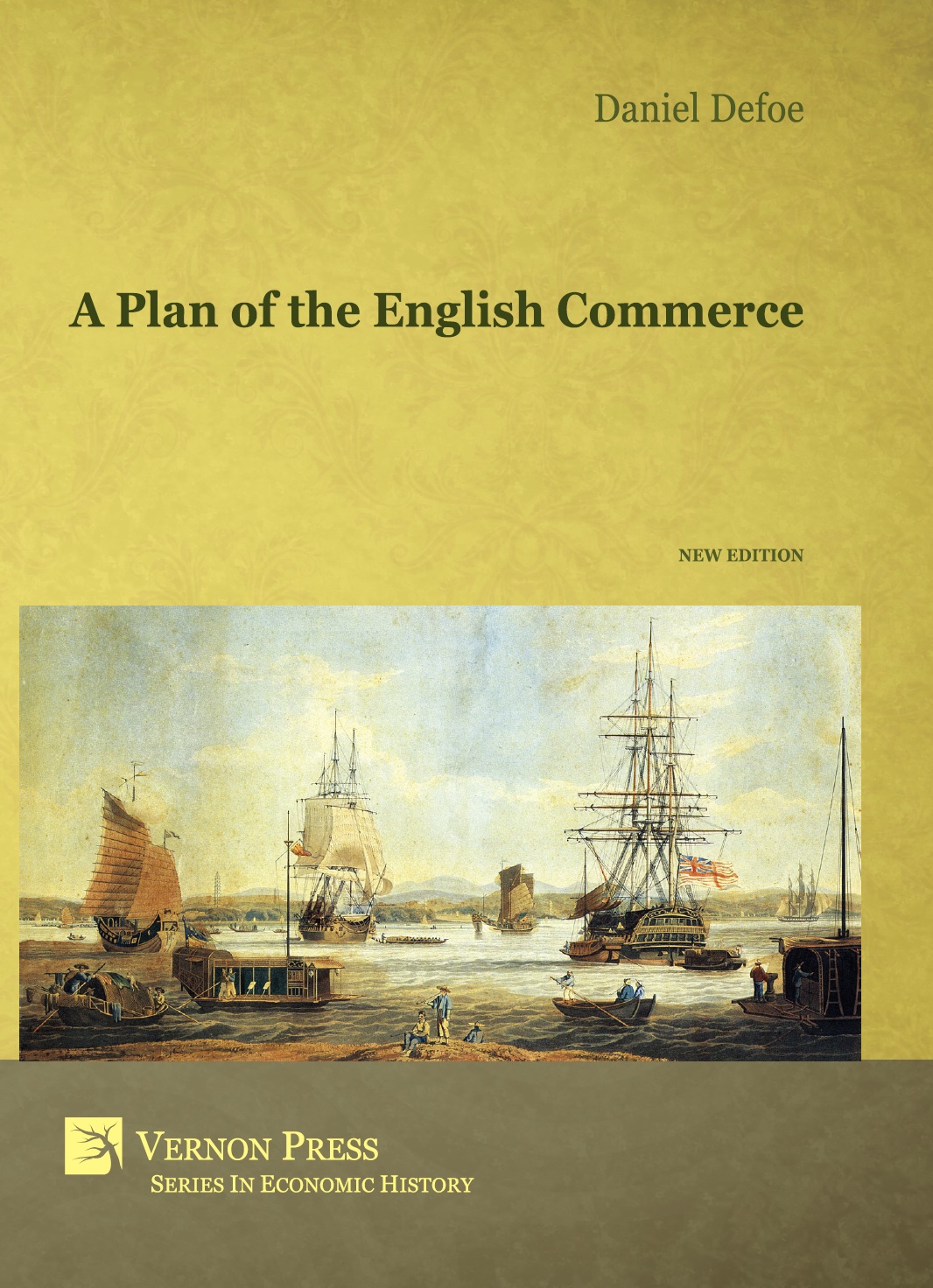Purchase this book
(click here to change currency)
"Defoe’s main economic work, A Plan of the English Commerce (1728), is almost forgotten now.[...] However, the book was a thorough and insightful account of Tudor industrial policy (under England’s Tudor monarchs) that has much to teach us today. [...] Defoe clearly shows that it was not the free market but government protection and subsidies that developed British woolen manufacturing." Ha-Joon Chang, Bad Samaritans, pp. 23-26 (2008, Bloomsbury Publishing)
A Plan of the English Commerce is a rare piece of economic history covering the crucial period at the outset of the first Industrial Revolution and the early wave of globalization. Unlike other chroniclers of British economic development, Defoe was contemporary to and often had first-hand experience of important events. His account therefore offers an extraordinary vantage point, free from the distorting lens of modern theoretical explanations. An account rich in anecdotes and penetrating observations, Defoe’s work emphasizes neglected aspects of the world economy at the time, such as the interplay between industrial policy and international trade. Defoe argues that, under the Tudors, British industry developed under a heavily protected regime. Contrary to widespread belief, export controls, infant-industry subsidies, government-sponsored industrial espionage and aggressive technology transfer were routine. A Plan of the English Commerce is principal among Daniel Defoe’s works dealing with economic matters and remains of interest not only to economic historians but also to scholars concerned with economic development, international trade and industrial policy. This New Edition has been typeset with modern techniques and contains a newly compiled Index of important topics. Aiming for visual clarity and the minimization of redundancy, the New Edition drops the largely arbitrary italicization of words and applies a modern formatting style to the rudimentary tables found in the original. It has been painstakingly proofread to ensure that it is free from errors and that the content is faithful to the original, down to the unusually long chapter headings.
PART I.
Chap. I. Of Trade in General
Chap. II. Of the Trade of England in particular
Chap. III. Of the first Rise, Growth, and Encrease of the commerce of England
Chap. IV. Of the Encrease of the English Commerce from the Time of Queen Elizabeth breaking with the Spaniards
Chap. V. Of the Present State of the English commerce, especially that Part of it which relates to the Woollen Manufacture; the Prodigy of its Magnitude, some Enquiry into bow it may be called Great, and what Magnitude really is
Chap. VI. Of the Magnitude of the British Commerce, as it respects the Consumption of Foreign Goods imported from Abroad as well as of our own Product and Manufactures at Home
Chap. VII. Of the Magnitude of our Trade, as it relates to our other Exportations, and particularly what we call Re-exportation, or exporting by Certificate, including the Exports of Goods first imported from our own Colonies and Factories Abroad
PART II.
Chap. I. A solid Enquiry into that important Question, Whether our Trade in general, and our Woollen Manufacture in particular, are sunk and declined, or not?
Chap. II. An Enquiry whether the Exportation of our other Goods, the Growth, or Manufactures of England, or Home Consumption of them is decreased or declined.
PART III.
Chap. I. Of the Improvement of the English in Trade, upon the Inventions of other Nations, and the Encrease of our Commerce upon those Improvements, in which we have beaten out the said Inventors from their own Trade; likewise of the several Imporvements of our own Product, and of our own Invention, by all which our Trade is greatly encreased.
Chap. II. A Proposal for rooting out those Nests of Pyrates and Rovers, the Turks and Moors of Tunis, Tripoli, Algier, and Sallee, who have for so many Ages infested the Mediterranean Seas, and the Coasts of Spain and Portugal, to the infinite Loss and Discouragement of all the trading Nations of Europe. With a Scheme for the Improvement of Trade, by restoring and establishing the ancient Commerce on the North and North West Coast of Africa
Chap. III. A Proposal fothe Improvement and Encrase of commerce upon the Western Coast of Africa, the coast of Guinea, from Sierra Leon, vulgarly call'd Seraloon, to the Coast and Gulpb of Benin.
Chap. IV. A Proposal for an Encrease and Improvement of the British Commerce on the East Coast of Africa
Chap. V. A Proposal for turning the whole Trade for Naval Stores, Timber, Deals, &c. from the East Country, and from Norway and Sweden, to our own Colonies, and yet without putting the Government of England to the dead Charge of Bounty-Money on that Importation
Daniel Defoe (1660-1731) was an English merchant, civil servant, journalist, writer, economist and spy nowadays best known for literary classic Robinson Crusoe. Hailing from a humble family, Defoe's ambition, restless nature and ability to bounce back from failure took him to faraway lands, engaged him in countless business ventures and an equal amount of problems with creditors, business and political adversaries. Working for the Crown nurtured his thinking on matters of national interest and exposed him to the leading policy thinking of the time. The breadth of his experience, the versatility of his mind and the popularity of his writing made him much sought after. Powerful political patrons would variably seek to profit from his services or to curtail his influence. Defoe published over 560 books and pamphlets in topics as diverse as politics, crime, economics, history, topography, personal relationships and spirituality before turning to fiction in later life.
See also
Bibliographic Information
Book Title
A Plan of the English Commerce
Book Subtitle
New Edition
ISBN
978-1-62273-001-8
Edition
1st
Number of pages
187
Physical size
236mm x 160mm





